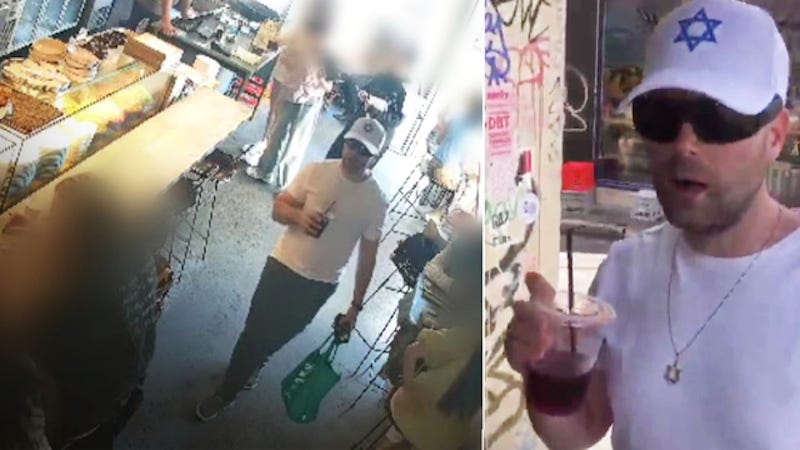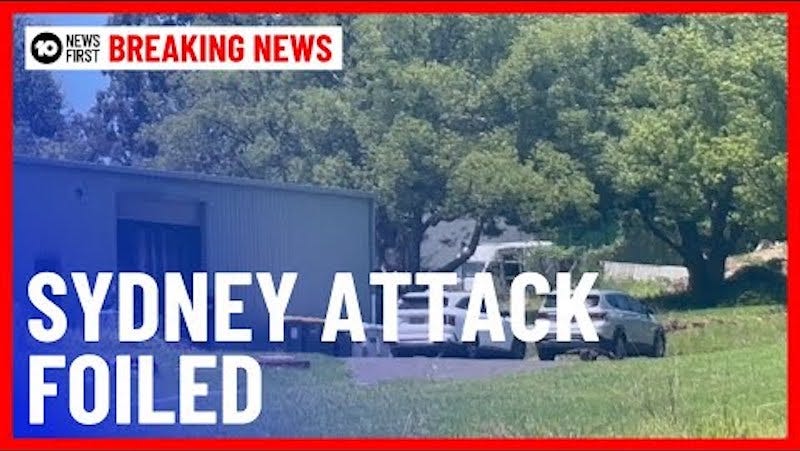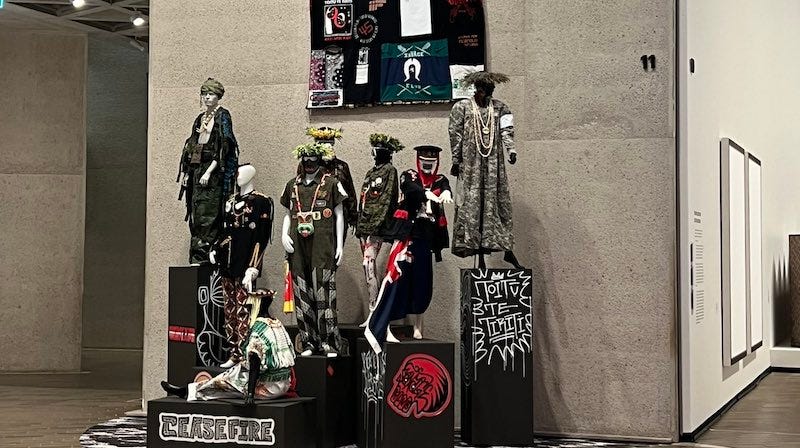Manufacturing outrage: The media’s alliance with Zionist provocateurs
A functional, pluralistic and democratic Australia can only thrive when were are unburdened by the question of whose voices are being silenced, and why.
A recent incident in Sydney’s Inner West has raised many questions about the manipulation and creation of anti-Semitic incidents in Australia by right-wing extremists and agitators. Ofir Birenbaum, a prominent member of the controversial Australian Jewish Association and a known Zionist provocateur, attempted to manufacture an incident at the Cairo Takeaway cafe in Newtown where, wearing a Star of David cap, he tried to provoke a hostile or anti-Semitic reaction that could be captured by Daily Telegraph reporters waiting outside.
The goal was to create a sensational story about rampant anti-Semitism in Australia, push a narrative of an under-protected Jewish community and, in turn, continue to launch political attacks against the Labor government. Yet in Newtown – a suburb well-known for its diversity and inclusive culture – the provocation didn’t succeed: Birenbaum’s actions were met with disinterest, and a best to leave this dickhead alone approach. No matter what he tried, staff and patrons at the cafe simply went about their day. Consequently, not only did the Daily Telegraph fail to get the inflammatory story they were after, it also exposed the larger dynamics between right-wing media outlets and extremist pro-Israel activists who collaborate to manipulate public sentiment.
The issue goes beyond this one incident: Rupert Murdoch’s media empire has a long record of backing pro-Israel positions and narratives, with coverage that is often supportive of the Israel’s government and policies, leaving no room for more nuanced or critical perspectives. Such one-sided messaging deepens community tensions, stirs up Islamophobia, and delegitimises anyone critical of Israel’s policies by painting them as prejudiced or anti-Semitic.
In many cases, it works because they exploit the fear of anti-Semitism – which, of course, is a very real phenomenon – and exaggerate or manufacture incidents to heighten public anxiety. This approach not only fuels prejudice toward other communities, particularly Muslim and Middle Eastern Australians, but it also distracts from legitimate discussions about the Israeli government’s controversial policies, such as settlement expansion in the West Bank, the unresolved status of the occupied territories, or the attempts of genocide in Gaza.
Birenbaum’s failed attempt to manufacture outrage reveals how much of a miscalculation it can be to try such a stunt in an area like Newtown, where cultural diversity is part of everyday life. Here, anyone is generally free to dress and express themselves as they please, religious symbols included. Ironically, his actions inadvertently shone a light on exactly how certain factions are trying to foment hatred, and strengthened the resolve to reject such divisive tactics in the process.
Beyond this incident, there is a concern about a wider pattern of racially motivated violence and intimidation. Recent incidents, such as two women being assaulted in Epping in Melbourne – one of them pregnant and choked with her own hijab – remind us that hate crimes and racism of all types must be taken seriously. The police response to these cases was relatively slow, which raises other questions about biases in law enforcement.
What emerges from all of this is how particular media operators and ideologically driven individuals can collude to manufacture controversies for political advantage. Broader debates about Israel – whether it pertains to its establishment, the 1948 or 1967 borders, the ongoing violent settlement and policies, or genocide in Gaza – need to occur in an environment where all voices can be heard, without fear of being automatically labeled as hostile to an entire group of people.
One-sided political responses have aided the outrage
Australia’s political leaders often position themselves as staunch opponents of racial or religious hatred, yet their actions frequently reveal a very different story. In the aftermath of this failed provocation in Newtown, the conspicuous silence from key figures, including the Prime Minister, Anthony Albanese, shows how officials can shrink from manipulative media narratives – especially when they originate from powerful outlets.
The fact that this incident took place in Albanese’s own electorate of Grayndler without so much as a public statement of support for the workers at the Cairo Takeaway cafe speaks volumes. Political leaders are busy people, but they often find the time to comment on a range of local matters, and it would not have been unreasonable for the Prime Minister or even the NSW Premier to express concern or, at the very least, check on the concerns of a business drawn into a media stunt. That nothing of the sort happened fuels the double standard, where criticism or scrutiny of certain individuals or groups is all but off-limits and the political class mostly looks away.
It seems that nobody in government wants to risk the wrath of a media apparatus that holds the power to amplify or dampen political fortunes. As a result, the government’s message to the public is one of tacit acceptance, suggesting that if powerful media barons or well-connected interest groups orchestrate disinformation, officials will quietly stand aside.
The weakness of political leadership is also apparent when sensational, potentially harmful media stories go unchallenged. An example of this is the Sydney Morning Herald’s report about a caravan allegedly loaded with explosives on the outskirts of Sydney and a supposed list of Jewish targets. Their alarmist headlines – which were then magnified in other media outlets – implied Australia was on the verge of a serious terrorist plot, but the follow-up revealed that the explosives were decades old, likely to be inactive, and that the “list” of targets just simply didn’t exist. Someone had just made the story up.
Despite the story’s debunking, there was no mea culpa from either the newspaper or public officials who might have questioned the narrative’s origins. Instead, the correction was buried, and the fleeting panic it caused lingered in the public consciousness. Such episodes show how easy it is for the media to manufacture panic that benefits specific agendas, with little pushback from political leaders who ought to defend the public’s right to fair and accurate information.
By tolerating these fabrications, or at least failing to challenge them, political leaders are enabling a climate of mounting tension. When false or exaggerated stories about anti-Semitic plots are circulated, it leads to inflated fears within Jewish communities. Meanwhile, some in the broader public grow cynical, feeling that accusations of bigotry and hatred are wielded more like political tools than genuine concerns – which then dilutes the seriousness of real incidents of anti-Semitism.
This same dynamic spills over into other forms of prejudice, including Islamophobia, contributing to an atmosphere where the term “hate crime” can be weaponised for political point-scoring rather than addressing actual offenses. Ultimately, those who face genuine discrimination, whether they be Jewish, Muslim, or any other group – are left in a precarious position, unprotected by political leaders who are more interested in appeasement rather than principled leadership.
The real tragedy here is that such timid political responses harm both majority and minority communities. They allow extremist viewpoints – those that genuinely do advocate racist or hateful ideologies, such as News Corporation – to flourish amid the loud noises of manufactured outrage. By not calling out hoaxes out with the same force used against legitimate cases of discrimination, the government places all of these incidents on the same level, fostering public confusion and weakening the seriousness of legitimate concerns. This environment emboldens individuals who truly harbor anti-Semitic or Islamophobic sentiments, giving them more credibility than they should ever have. It also undermines the possibility of critical debate about foreign and domestic policy related to Israel, Palestine, and other contentious issues.
What is needed is simple yet it remains elusive: principled leadership willing to hold media organisations accountable, regardless of the political risk, combined with a commitment to confronting bigotry in all its forms. When politicians refuse to waver in the face of powerful media proprietors, they send a clear message that weaponising hatred for clicks, sales, or political favour will not be tolerated. Conversely, by not doing anything about these issues, it suggests that these political leaders either condone the behaviour, or are simply too weak and lack the courage to call out these manipulations, regardless of the source.
The silent strings: How the Israel lobby mutes criticism
One of the other parts of the ongoing manipulation in Australia’s public debate is the growing list of individuals who find their voices muzzled the moment they challenge or question Israel’s policies. From the journalist Antoinette Lattouf to the academic Tim Anderson, and now the artist Khaled Sabsabi, whose commission at the 2026 Venice Biennale was withdrawn by Creative Australia, each example shows a pattern of swift and disproportionate retaliation. Instead of open dialogue or genuine engagement with the substance of their critiques, these people have faced professional setbacks, terminations, and erasure from cultural and academic institutions.
The rationale is almost always vague – somehow “offensive” work or “controversial” statements – while the real story, as many suspect, is that a small, well-connected lobby has exerted influence behind the scenes, usually through threats of withdrawing funding or other retaliations. When art containing images of the Palestinian flag is quietly censored – the National Art Gallery in Canberra censored the tapestry created by the art collective SaVĀge K’lub – or individuals are dropped from high-profile exhibitions without transparent explanations, it’s obvious that the criticism of Israel is being relegated to the margins in a supposedly free society.
What makes this trend unacceptable is that it dismantles the very principles that Australian democracy claims to hold dear. The nature of academic inquiry is supposed to be rigorous, involving a contest of ideas tested against facts and peer review. If a professor calls Israel an apartheid state – as Tim Anderson did in 2018 – a proper response should emerge through research and debate rather than abrupt dismissal.
The same principle applies to the arts; creative expression often provokes discomfort or controversy, and that is precisely its job. By punishing artists who reflect on real-world conflicts, cultural institutions abandon their commitment to diverse perspectives. In these acts of censorship or “quiet removals”, officials are placating a tiny but influential lobby, stifling conversation on issues that deeply affect Australia’s multicultural population. Meanwhile, the broader public is left wondering why certain topics are off-limits and who decides that some viewpoints must vanish without explanation.
This climate is evolving into a modern-day McCarthyism, in which the smallest suspicion of being “too critical” of Israel triggers punitive measures. For those who stand up for Palestinians, it can feel like a precarious balancing act. Rather than fostering a safe environment for legitimate dissent, Australia’s institutions are sending a message: speak out and you will be removed. The result inhibits not only controversial or provocative voices but also anyone who might support them. Eventually, public debate becomes sterile, absent of the kind of fearless, critical thought that marks a robust and healthy democracy. And this, ultimately, is not good for any democracy.
Yet this level of censorship, even if it might be effective in the short term, rarely silences an idea forever. The anger it generates often leads to stronger, more unified calls for change. As more people notice the removal of dissenting voices, they begin to question the motives and the power structures behind such decisions. Although censorship on behalf of the state of Israel may not be on the scale of the United States, where media consolidation and lobbying are furiously ridiculous, bordering on fascism, the echoes in Australia are loud enough to raise alarm.
It’s unlikely to happen, but this is the moment that demands courage from those who occupy positions of influence, whether in government, media, academia, or the arts. People who promote free speech and the right to critique power must be willing to protect those who offer inconvenient truths or unpopular perspectives. The irony is that open debate would likely strengthen Australia’s institutions; it would give communities – Jewish, Muslim, or otherwise – more confidence that concerns and criticisms can be aired without fear of reprisal and the refusal to engage openly simply breeds more mistrust.
No matter how strong the attempt to silence critics, the fundamental issues remain: the complex reality of the Israel–Palestine conflict, the consequences of foreign policy decisions, and the moral questions raised by longstanding military occupations, genocide and human rights abuses. Suppressing discussion about these matters only heightens divisions, disenfranchises the marginalised, and allows genuine extremism to grow in the shadows, such as the extremism that is promoted by News Corporation.
Australia’s best defence against imported hatred and internal strife is a forthright commitment to democratic values – ones that do not kotow to pressure from any lobby, no matter how well-funded or influential. It doesn’t require additional protection, just application of the laws as they exist: protecting those who challenge entrenched power structures, insisting on transparency in decision-making, and standing up for the free flow of ideas – even when doing this poses a risk. Only then can a functional, pluralistic Australia thrive, unburdened by the question of whose voices are being silenced, and why.












Thank you for such a careful article.